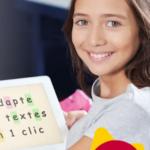During educatech Expo event, we interviewed Isabelle Preud’homme, Director of Cned’s Lab’innovation, who emphasizes the importance of existing and emerging technologies and innovations in advancing pedagogical models and consequently improving learning. Is Cned at the forefront of innovation?
We are entirely focused on the needs of our remote learners and are aware that there is significant potential for improving their learning experiences.
Isabelle Preud’homme, director of Cned’s Lab’innovation
She highlights that technology can transform pedagogical models and, as a result, enhance the learning experience.
« We innovate with existing technologies, but also in R&D, which includes all emerging technologies that may produce the pedagogical and support models of tomorrow. Cned conducts various experiments to meet the immediate and future needs of remote learners.«
A vast pool of « testers » for innovations: the learners
As discussed with Isabelle Preud’homme, Cned engages a community of learners to test several innovations.
« We develop innovative devices in Proof of Concept (POC) before opening them in Pilot to test them with our learners » (POC, proof of concept or validation of principle).
« When we launch a pilot with an innovative technology integrated into our courses, we reach 3,000 to 4,000 students for a single grade level. For her, this is an enormous source of information given the data they can collect and scientifically analyze to understand usage. In parallel, the innovations team also conducts surveys with students: ‘We collect the narrative of their journey to understand where the problems lie, how they perceive these new technologies, and especially what we need to change. » she adds.
AI and virtual reality: Preferred domains for innovation and R&D
AI is undoubtedly part of the innovations tested by Cned.
« We have already experimented with adaptive learning paths (…) AI could further individualize to aim for customization. » she explains.
In this field, another experiment was conducted with the company Stellia: « Training an Artificial Intelligence with our pedagogical content, textual and video, allowed us to create a virtual assistant that immediately addresses students’ needs when they have difficulty understanding their course.«
Regarding virtual reality, which is also mentioned in Cned’s innovations, Isabelle Preud’homme emphasizes the importance of using technology by seeking its utility in learning.
How can virtual reality solve comprehension problems where video has failed? This is the question the Cned teams asked about virtual reality.
« We have started working on a first prototype on the subject of understanding solids, the number of edges of a solid, the calculation of lengths and volumes to finally see, concretely, a construction take shape. » she describes.
Certainly, virtual reality offers many advantages, as Isabelle Preud’homme explains, promoting autonomy, facilitating trial and error, self-correction, manipulation, and concrete visualization of one’s work.
« It creates an emotional experience and triggers memorization. » she adds.
R&D is an integral part of Cned’s missions; it takes time, but as our interlocutor concludes, « it is an investment for the future.«
To navigate the ecosystem and promote innovation, how does Cned engage with Edtech companies? How does it choose and identify them? This is what we invite you to discover in the next episode, with Muy-Cheng Peich, Director of PIA projects (Future Investment Plan).
More information: cned.fr







